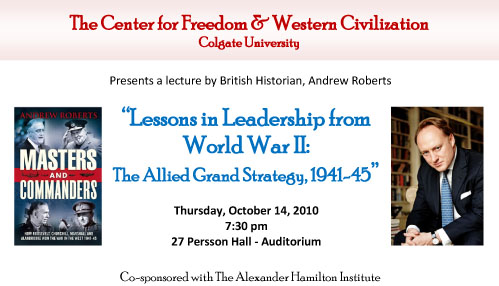The Alexander Hamilton Institute and Colgate’s Center for Freedom & Western Civilization, directed by Robert Kraynak, sponsored the appearance Thursday evening at Colgate University of the British historian Andrew Roberts, one of the leading military historians of his generation. 
Mr. Roberts, a honors graduate of Cambridge University, has published more than a dozen major books on the history of warfare, includingMasters and Commanders (Harper 2009) and The Storm of War: A New History of the Second World War (Allen Lane 2009).
In his presentation to a packed house at Perrson Hall, Mr. Roberts discussed the role of personality and contingency in the formulation of the Anglo-American alliance that ultimately helped send Hitler to defeat and death. Drawing on Masters and Commanders, Mr. Roberts described the uneven relations between Winston Churchill, Franklin Roosevelt, George Marshall, and Sir Alan Brooke in the formation, largely by Marshall’s design, of the Combined Chiefs of Staff Committee and in the making of such crucial decisions about strategy as the timing of and location of D-Day. One of the most powerful lessons that General Marshall had learned from the disaster of Pearl Harbor was the importance of a unified command structure. That innovative command structure made the vital decision to concentrate on the defeat of Germany first, while conducting a holding operation against Japan in the Pacific.
Congratulations to Mr. Roberts on an engaging performance. We look forward to his promised return to the AHI.

Leave A Comment